United States Of Tara: "The Good Parts"

If I didn’t know that “The Good Parts” wasn’t a planned series finale for United States Of Tara, I’d be very surprised. Yeah, the story is left open for what might have been a fourth season about Tara going to Boston to confront what happened to her head-on with a new therapist (who presumably would have been played by a big-name guest star), but everything is so… closed off at the end. Kate’s still with Evan, but she’s moving back into the Gregson home to take care of Marshall while Max and Tara are in Boston. Charmaine and Neil are headed off for the great state of Texas. Marshall’s resolving to tell everyone exactly what he thinks of them at all times. It’s a little loose and loopy for a finale—like the show itself—but inside of it, there’s some really great stuff, including a handful of the best scenes the show’s ever done. It’s also got the quiet, ruminative quality a lot of the best series finales have, a quality that benefits it in spades.
The best thing the finale does, I think, is restore Tara Gregson to the center of the show’s sympathies. I know that Tara’s always the center of the show, but in this season, it was easy to forget that Tara was at one time the show’s hero, so far down the rabbit hole did she drag her family. In the finale, which is almost completely free of alters (Bryce turns up at the very beginning, and we get the sense Alice, Buck, and T survived the carnage to make the trip to Boston), we once again see that she’s just a Kansas mom, trying to hang on to her mental capacities long enough to not disappoint her kids and be a good wife to her husband. Toni Collette has spent the last half-dozen episodes or so mostly showing us the terrible things about Tara’s condition, so it was nice to have an episode that reminded us why these people are always so quick to forgive her, even when her alters do awful, awful things.
The episode also turned its focus—as most of the season has—on Max, who found himself suppressing various violent outbursts that would have led to him, respectively, walking out the door (seemingly forever) and strangling Ted where he sat at the last family dinner. We’ve seen these “character says what he’s really thinking and then it’s actually a daydream” scenes enough times in other shows and movies to not find this particularly revolutionary (though it is nice to get a sense of just how deep Max’s rage runs), but the show uses this against us, having Max’s final outburst at the dinner table—which involves throwing a turducken against the wall (and those things don’t hold together all that well)—be something that really happens. In this case, though, Max directs his rage outward. He’s not mad at his wife. He’s not mad at Ted. He’s mad at the universe for making him put up with this shit. In a season that was just as much about the writers’ frustration with how Tara can never change, this is a scene that feels almost like a television character realizing who he is and raging at the writers controlling his life.
The kids also get some nice moments here. For a character who seemed so vapid when the series began, it’s amazing how quickly Kate has become the steady center of the family in this season. With her mother falling apart and her father unable to deal with it, Kate has become the voice of reason in many, many scenes, and when she tells Marshall—who’s all but ready to write off the family forever—that this is all he has, it feels surprisingly in character, perhaps a testament to the fact that Kate’s the character who’s changed the most over the course of the series. (If you watched the pilot immediately before this episode, you’d be hard pressed to recognize her, I have to think.) And Marshall’s the family member who most nurses his grudge at Tara. He has good reasons, I think, what with the way that Bryce stole focus from him in his time of need, but the scene where he finally comes to forgive her in his own way as the two sit by the curbside memorial to Lionel is very sweet. (I also liked the horrified reactions to the notion that he might go and live with his grandmother in lieu of staying in the house alone while Tara and Max are gone.)
 Keep scrolling for more great stories.
Keep scrolling for more great stories.
